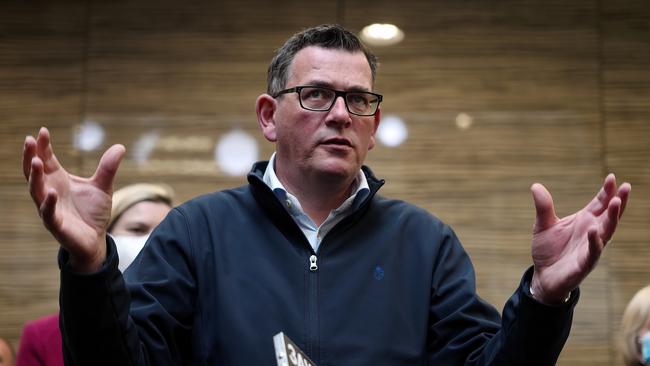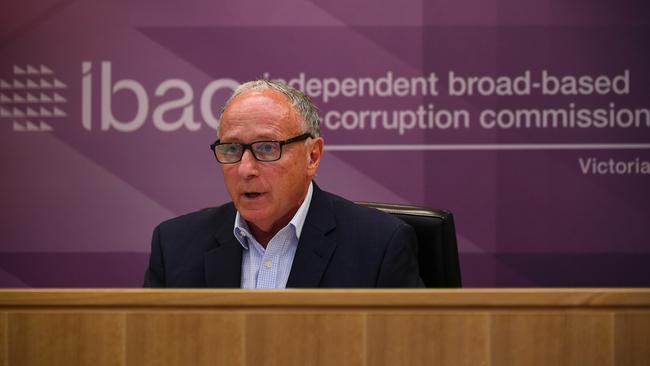Shannon Deery: Voters left in the dark on corruption findings
With polls open and four corruption investigations on foot involving Dan Andrews and his government, many Victorians don’t really know what they’re voting for.
Opinion
Don't miss out on the headlines from Opinion. Followed categories will be added to My News.
With the polls now open, Victorians have started casting their votes.
But they’re doing so blind, and will continue to do so until election day.
Because with four active corruption investigations on foot involving Daniel Andrews and his government, we don’t really know what we’re voting for.
A fifth investigation could soon be launched, with consideration being given to properly examining the original police probe into the Red Shirts election rort.
Yes, Red Shirts has been investigated ad nauseam.
What hasn’t been looked at in detail are serious complaints of corruption that claim the original police investigation was a sham.
It would, by the nature of the complaint that has been made, involve key government figures.
And these are just the probes we know about.

Much of the work done by Victoria’s anti-corruption agencies is done behind closed doors with strict confidentiality in place.
Breach them, and face jail.
It is very possible that there are other probes bubbling away, but we would never know.
On the other side of the fence Matthew Guy’s involvement in a donor scandal that resulted in the resignation of his chief of staff remains under investigation by the Victorian Electoral Commission.
It has also been referred to the Independent Broad-based Anti-corruption Commission.
Last week, the Herald Sun revealed the IBAC was being dragged through the Supreme Court to stop the release of two major reports.
Key developments in both cases, both of which involve the Andrews government, mean that neither report will be published before the state election.
The first case regards an injunction being sought by developer John Woodman to stop IBAC tabling a report on allegedly corrupt Casey land deals.
In the other case the extent of IBAC’s powers to do its job at all are being directly challenged.
That investigation is looking into the conduct of, and conduct in relation to, some members of the Victorian government and the executive.
On Monday morning the Premier was asked directly about the lack of transparency over the outstanding investigations.
“Well, agencies run their own processes and final reports will be issued when those agencies determine they are ready to be issued,” he said.
“If they have findings to make, they’ll make them, no findings have been made at any point.”
The problem is that’s just not entirely right. And the Premier should know that.
Because in May IBAC commissioner Robert Redlich wrote to his Attorney-General, Jaclyn Symes, complaining that he was being blocked from tabling findings.

It is one of a series of complaints Mr Redlich, whose term ends next month, has become increasingly vocal about in recent months.
You get the impression that even he thinks IBAC is a toothless tiger.
It gives the impression that something is being done, but in reality it is underfunded, underresourced and underpowered.
In his May letter Mr Redlich made it clear that IBAC had completed reports that it wanted to publish. And it had made findings it desperately wanted to make public.
Despite claims of the agency’s independence, that independence only extends so far, as Mr Redlich himself pointed out.
The IBAC Act requires it to undertake a natural justice process when finalising a report to be tabled in parliament.
Rightfully so, anyone to which an adverse comment is to be made must first have the right to respond or challenge aspects of the investigation process.
Legal challenges are separate to IBAC and run through the courts.
But as Mr Redlich pointed out: “the speed with which the litigation is determined is largely under the control of the court”.
Specifically, Mr Redlich raised the challenge of Mr Woodman.
“Despite the importance of the recommendations that are likely to be made arising out of that investigation, the completion of the report has stalled,” he said.
“The tabling of the special report in parliament has been delayed … the time frame for the tabling of the Sandon IBAC report is now beyond IBAC’s control.”
Mr Redlich urged changes to the IBAC Act to allow him to hand reports down in a more timely manner. The Opposition introduced the IBAC Amendment (Facilitating Timely Reporting) Bill in June to do just that.
“This Bill seeks to ensure the timely tabling of IBAC reports in parliament and to expedite their tabling while preserving relevant protections of the rights of those upon whom IBAC may comment unfavourably,” shadow treasurer David Davis said at the time.
“The Bill … strikes an appropriate balance in preserving the rights of those on whom adverse comments may be made by IBAC and the risk that legal machinery, shenanigans and roadblocks are used to stymie the release of a critical IBAC report in a timely way.”
The government, with the help of the Animal Justice Party and Transport Matters Party, defeated the Bill. The IBAC commissioner has raised a serious issue with his ability to table reports as and when he sees fit.
Nothing’s happened, and as we go to the polls we’re none the wiser.



